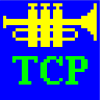 .ico used by the application shortcut to .ico used by the application shortcut to TCPMAN.EXE, which is part of Trumpet Winsock | |
| Original author(s) | Peter Tattam, Trumpet Software International |
|---|---|
| Initial release | 1994 |
| Operating system | Microsoft Windows |
| Successor | None (by Trumpet Software); The Microsoft implementation of Winsock with Windows 95 |
| License | Shareware |
| Website | Trumpet.com.au |
Trumpet Winsock is a TCP/IP stack for Windows 3.x that implemented the Winsock API, which is an API for network sockets. It was developed by Peter Tattam from Trumpet Software International and distributed as shareware software.
History
The first version, 1.0A, was released in 1994. It rapidly gained reputation as the best tool for connecting to the internet. Guides for internet connectivity commonly advised to use Trumpet Winsock. The author received very little financial compensation for developing the software. In 1996, a 32-bit version was released.
Lawsuit
In the Trumpet Software Pty Ltd. v OzEmail Pty Ltd. case, the defendant had distributed Trumpet Winsock for free with a magazine. It did also suppress notices that the software was developed by Trumpet Software.
Replacement by Microsoft
Windows 95 includes an IPv4 stack but it is not installed by default. An early version of this IPv4 stack, codenamed Wolverine, was released by Microsoft Windows for Workgroups in 1994. Microsoft also released Internet Explorer 5 for Windows 3.x with an included dialer application for calling the modem pool of a dial-up Internet service provider. The Wolverine stack does not include a dialer but another computer on the same LAN may make a dialed connection or a dialer not included with Wolverine may be used on the computer using Wolverine.
Architecture
The binary for Trumpet Winsock is called TCPMAN.EXE. Other files included the main winsock.dll and three UCSC connection .cmd file scripts.
References
- Edwards, Benj (2015-11-18). "What It Was Like To Build A World Wide Web Site In 1995". Fast Company. Retrieved 2021-11-02.
- Freed, John C. "Internet Q&A". The New York Times. Retrieved 2021-11-04.
- Cifuentes, C.; Fitzgerald, A. (May 1997). "Copyright in shareware software distributed on the Internet---the Trumpet Winsock case". Proceedings of the 19th international conference on Software engineering - ICSE '97. pp. 456–464. doi:10.1145/253228.253382. ISBN 0897919149. S2CID 14737455.
- "The Story of Shareware, the Original In-App Purchase". Vice. November 2016. Retrieved 2021-11-02.
- "Trumpet launches 32-bit 'sock". Australian Financial Review. 1996-07-23. Retrieved 2021-11-02.
- Reed, Chris (2004). Internet law: text and materials (2nd ed.). Cambridge, UK: Cambridge University Press. p. 70. ISBN 0-521-60522-9. OCLC 56632088.
- Hopke, Philip K. (1995-11-01). "How to start surfing the internet". Chemometrics and Intelligent Laboratory Systems. InCINC '94 Selected papers from the First International Chemometrics Internet Conference. 30 (1): 1–9. doi:10.1016/0169-7439(95)00064-X. ISSN 0169-7439.
- Abraham, Ralph (1995). The WEB empowerment book: an introduction and connection guide to the Internet and the World-Wide Web. Frank Arnoud Jas, Willard Russell. Santa Clara, Calif.: TELOS. p. 121. ISBN 0-387-94431-1. OCLC 32517658.
External links
- Official website
- Internet Archive - Trumpet Winsock
- Winworld - Trumpet Winsock
- Cyber Harvard - Using Trumpet On Netcruiser Accounts